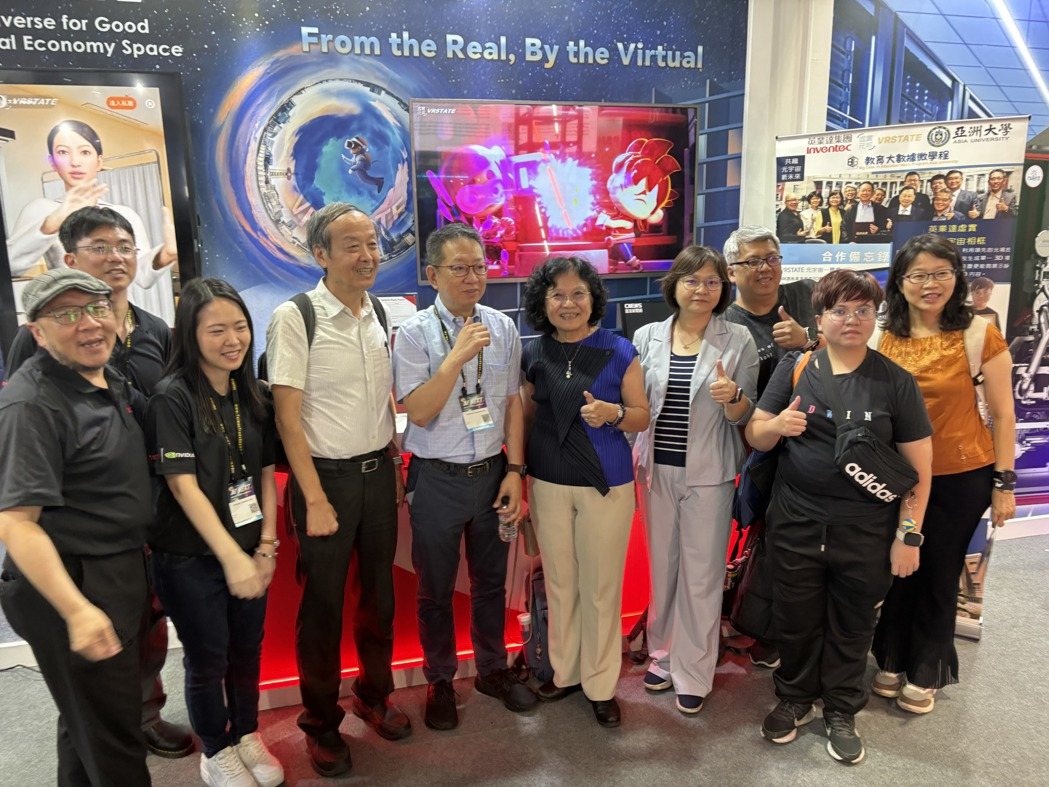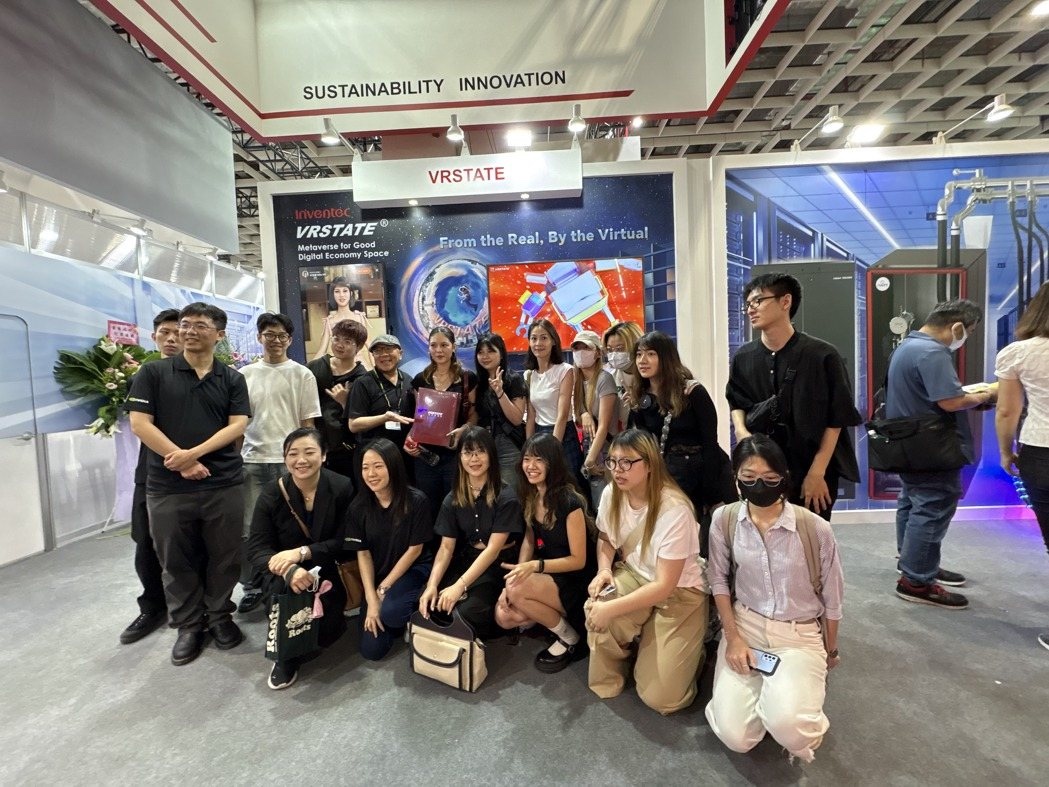Inventec, a major contract manufacturer, has taken another significant step forward in its virtual-physical integration technology! Recently, the team collaborated with group partners Inhon and Asia University to integrate their metaverse "Virtual-Physical Integration Space" with the cutting-edge "AI Virtual Human" technology and Inhon's self-developed comprehensive physiological measurement system "Family Treasure," successfully developing the latest "AI Virtual Health Manager" within the Virtual-Physical Integration Space. The team is further introducing it into dozens of care institutions participating in the USR project in the Greater Taichung area, striving to capture the vast business opportunities in smart healthcare through high-performance cloud-based care technologies.
The Inventec Metaverse Technology Division stated that this collaboration mainly took place within the company's metaverse space "Virtual-Physical Integration Space." It leverages not only Inventec's robust AI computing and backend hardware processing capabilities but also draws on professional nursing knowledge provided by Asia University's expert care teams. To ensure timely updates on the health status of those being cared for, the product also integrates with Inhon's IoT physiological digital measurement and Family Treasure data system (including glucometers) to collect various health data from care recipients, providing more professional health consultation services tailored to different users.
Furthermore, the Metaverse Technology Division noted that the main cooperation partner this time was Asia University's School of Nursing, which also serves as the host unit for the USR project in the Greater Taichung region. To develop the "Smart Health Manager" with specialized caregiving expertise, experts from the university and Asia University Hospital were specifically assembled to handle data integration, generating professional health check reports. These reports are then sent to Inventec’s cloud computing AIGC (Artificial Intelligence Generated Content) platform to produce health consultation materials, enabling the virtual health manager to interact with users and provide consultations via equipment located at six senior centers across the central region.
Dean Wu Hua-shan of Asia University’s School of Nursing mentioned that the initial application field for this project primarily targets dozens of senior centers in Taichung City and Nantou County. The team hopes that this initiative will comprehensively enhance the quality of long-term care services and facilitate international expansion. Wu Hua-shan stated that the smart medical system currently under development will be capable of monitoring seniors' health conditions in real-time, allowing family members to access relevant information anytime, thus reducing concerns about elderly health. She added that the service became operational in its first year and is expected to continue expanding over the next three years, aiming to enter Southeast Asian markets facing rapid aging populations.
Discussing market potential, Wu Hua-shan emphasized that as the Taiwanese government places increasing importance on long-term care policies, more resources are being directed toward home and community-based care. She believes that Asia University's smart healthcare initiative can not only improve local care quality but also holds promise for expansion nationwide and even globally. Additionally, she pointed out that advancements in smart medicine contribute to better life quality for the elderly without encountering language barriers, making these solutions more competitive internationally. This project demonstrates Taiwan's potential in the fields of smart healthcare and long-term care services—enhancing domestic service quality while securing a position in global markets.
Asia University's Chief Information Officer Lin Junyuan also seized this opportunity to elaborate on the school's collaboration with Inventec regarding the development of "virtual human technology." He shared insights indicating that this technology aims to improve dementia patients' caregiving experiences. He admitted that many emotionally unstable dementia patients desire seeing photos of family members, prompting the team to explore how "virtual human technology" could be applied practically in caregiving settings. Ultimately, the team successfully partnered with Inventec to develop the "AI Virtual Health Manager," offering virtual companionship services where seniors can converse with virtual characters while receiving emotional support and health-related information.
Lin Junyuan highlighted that Asia University's School of Nursing leads nationally within nursing systems and has already begun collaborating with Inventec to develop intelligent care solutions. He stated that this cooperative plan is projected to implement over the next three years, having initially been tested in over ten midland care facilities.
Moreover, Lin Junyuan revealed that this technology utilizes Inhon's "Family Treasure" system to gather caregiver data analyzed by Al GC before delivering user-focused health consultations and remote care services. Seniors residing in care centers can now easily monitor their health statuses and receive AI-generated explanations, significantly enhancing both efficiency and quality of care experienced by residents. This advancement showcases Taiwan's growing strength in smart medical and long-term care sectors, promising improved domestic standards alongside international recognition.
Regarding commercialization ("business conversion"), the Metaverse Technology Division analyzed that approximately 300 individuals across six senior centers are currently registered participants. The team anticipates an expanded market reach possibly occurring next year, extending adoption to eight or twenty additional senior centers. Inventec plans to start with Proof Of Concept (POC) verification during the first year, officially launching actual commercial operations in the first half of next year. Besides adding functionalities like “appointment registration” and “shopping cart,” the initiative intends to offer enhanced services from the caregiving perspective, gradually guiding the entire industry towards full-scale commercial success.
 Inventec Metaverse Technology Division collaborates with Asia University School of Nursing to seize immense opportunities in smart healthcare. Photo by Reporter Wu Kangwei.
Inventec Metaverse Technology Division collaborates with Asia University School of Nursing to seize immense opportunities in smart healthcare. Photo by Reporter Wu Kangwei.
 Inventec Metaverse Technology Division collaborates with Asia University School of Nursing to seize immense opportunities in smart healthcare. Photo by Reporter Wu Kangwei.
Inventec Metaverse Technology Division collaborates with Asia University School of Nursing to seize immense opportunities in smart healthcare. Photo by Reporter Wu Kangwei.

